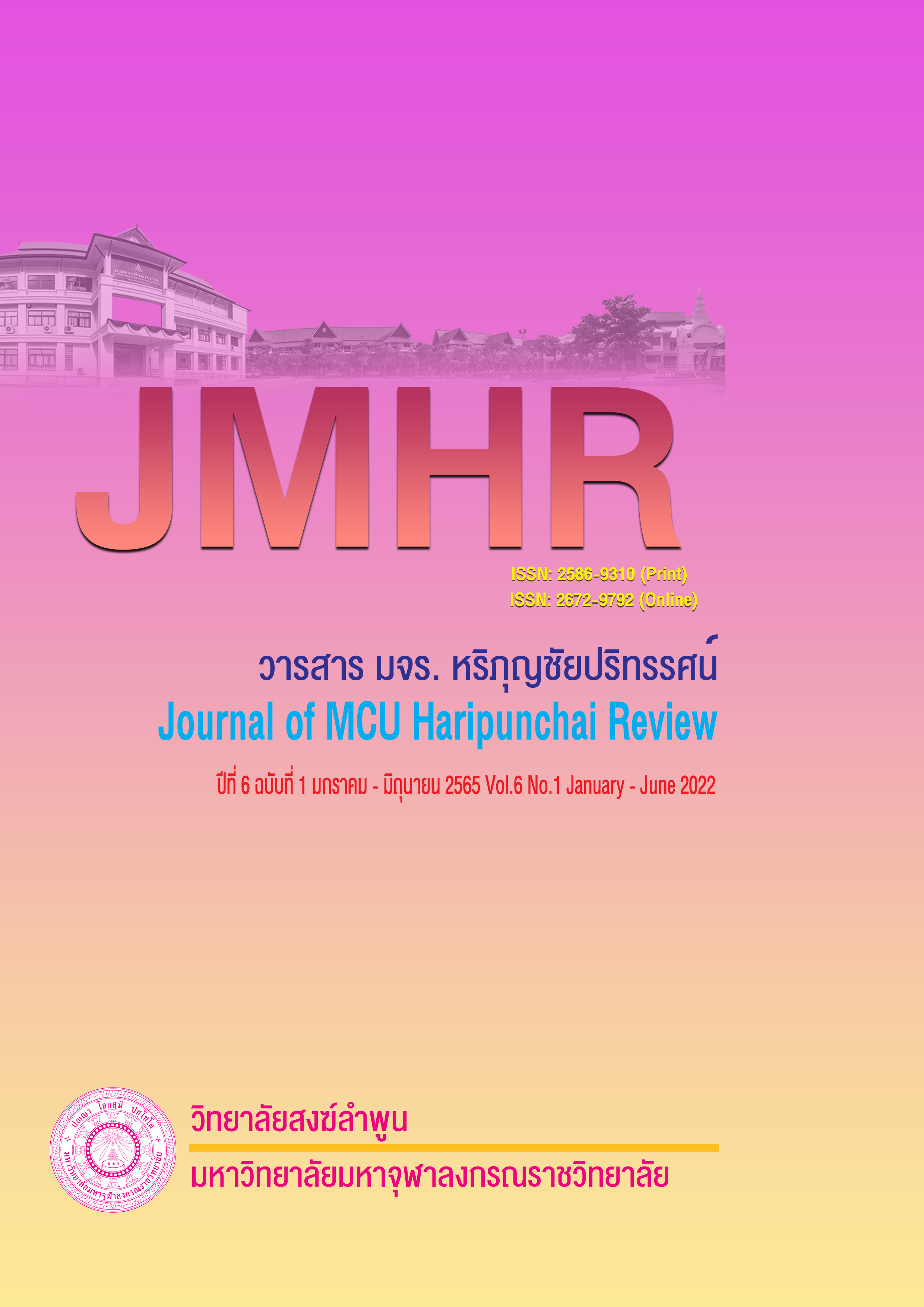Development of Corporate Governance of Employers and Employees according to Buddhist Principles in Thai society.
Main Article Content
Abstract
Good governance is a principle that has been with Thai society since the Constitution of the Kingdom of Thailand BE 2540. It has been combined with the enactment of a royal decree on criteria and procedures for public administration since 2003. It enables government agencies, state enterprises, and public organizations to carry out their activities in accordance with the rule of law, the principle of morality, the principle of transparency, the principle of participation, the principle of responsibility, the principle of worthiness for more than 20 years. For the private sector, it uses the term "Corporate Governance" to aim for good corporate governance. It can represent the relationships and shared responsibilities of all stakeholders. For governance in Buddhism, although it does not have a direct relationship, it can lead to its application for human development, job development, personnel relations and organizational development. This article aims to analyze for the development of good governance of employers and employees according to Buddhist principles in Thai society, which are: a lower direction i.e., an employee and an employer. For employees, there are 1) starting work early, 2) quitting after the boss, 3) no dishonesty, 4) being efficient at work, and 5) admiring and praising the boss. For employers, they should have generosity which includes 1) assigning appropriate tasks, 2) giving annual bonuses and rewards, 3) providing reasonable benefits, 4) giving gifts on special days, and 5) scheduling holidays and vacations.
Article Details

This work is licensed under a Creative Commons Attribution-NonCommercial-NoDerivatives 4.0 International License.
References
กรมสวัสดิการและคุ้มครองแรงงาน. (2562). วันหยุดพักผ่อนประจำปี. กลุ่มงานที่ปรึกษากฎหมาย นิติกรรมและสัญญา กองนิติกำ สำนักงานกรมสวัสดิการและคุ้มครองแรงงาน.
กลุ่มงานมาตรฐานการบริหารงานบุคคลท้องถิ่น. (2550). แนวทางปฏิบัติเกี่ยวกับเงินโบนัส (เงินประโยชน์ตอบแทนอื่น)เพื่อให้องค์กรปกครองส่วนท้องถิ่นถือเป็นแนวทางปฏิบัติ. กระทรวงมหาดไทย,
เครือข่าย TG รวมพลังป้องกันภัยการทุจริต. (2562). รวมพลังแก้ทุจริต...ต้องคิดแยกแยะ. กองป้องกันและและตรวจสอบการประพฤติมิชอบ สำนักงานตรวจการองค์กร.
ชัยวุฒิ เทโพธิ์และพงษ์เสถียร เหลืองอลงกต. (2563). ประสิทธิภาพการปฏิบัติงานของพนักงานในองค์กรปกครองส่วนท้องถิ่น. วารสารมนุษยศาสตร์และสังคมศาสตร์ มหาวิทยาลัยราชภัฏบ้านสมเด็จเจ้าพระยา. ปีที่ 14 ฉบับที่ 1 (มกราคม – มิถุนายน) : 252.
ตลาดหลักทรัพย์แห่งประเทศไทย. (2564). บรรษัทภิบาล หรือการกำกับดูแลกิจการ. [ออนไลน์]. แหล่งข้อมูล : https://www.setsustainability.com/page/corporate-governance [15 กันยายน 2564].
ตินตะบุระ, บรรพต วิรุณราช และศรัณยา เลิศพุทธรักษ์. (2557). การจัดสวัสดิการรูปแบบใหม่ของพนักงานในฝ่ายผลิต วิศวกร ทั้งระดับปฏิบัติการและผู้บริหารระดับต้นในเขตนิคมอุตสาหกรรมแหลมฉบังจังหวัดชลบุรี. วารสารวิทยาลัยพาณิชยศาสตร์บูรพาปริทัศน์. ปีที่ 9. ฉบับที่ 2. (กรกฎาคม-ธันวาคม) : 138.
ถวิลวดี บุรีกุล. (2558). ธรรมาภิบาล :กลไกสำคัญในการปฏิรูปเพื่อพัฒนาประเทศ. สถาบันพระปกเกล้า.
นวพร เรืองสกุล. (2545). บรรษัทภิบาล เรื่องที่นักลงทุนและกรรมการต้องรู้. กรุงเทพมหานคร: มาสเตอร์คีย์.
นุรไลลา ตือระ และนางสาวอานีซะห์ ลาเต๊ะ. (2559). การสรรหาและเลือกสรรบุคลากรเข้าท างานบริษัทในกลุ่มเซ็นทรัลมาร์เก็ตติ้ง. หลักสูตรรัฐศาสตรบัณฑิต สาขาวิชานโยบายสาธารณะ. คณะรัฐศาสตร์ มหาวิทยาลัยสงขลานครินทร์.
บริษัท ไทยเวลล์เท็กซ์ อินเตอร์โปรดักส์ จำกัด. (2562). นโยบายเกี่ยวกับของขวัญ การต้อนรับและการเลียงรับรอง. [ออนไลน์). แหล่งข้อมูล : http://cdn.wsp-pb.com/li2rcx/gifts-entertainment-thai-นโยบายเกยวกบของขวัญการต้อนรับและการเลี้ยงรับรอง.pdf [26 กันยายน 2564].
ปิยะนาถ สิงห์ชู. (2556). การกำกับดูแลกิจการที่ดี หรือ บรรษัทภิบาลหรือ ธรรมาภิบาล. [ออนไลน์]. แหล่งข้อมูล : https://www.gotoknow.org/posts/535005 [15 กันยายน 2564].
พระครูวินัยธรวราวุฒิ มหาวโร. (2564). ทิศ 6: อารยะแห่งการอยู่ร่วมกันในสังคม. วารสารสันติศึกษาปริทรรศน์ มจร. ปีที่ 5. (ฉบับพิเศษ) : 319.
วราภรณ ชัยโอภาส. (2549). การนำหลักธรรมในสิงคาลกสูตรมาใชใหคำปรึกษาจริยธรรมแกพอแม่. ปริญญาพุทธศาสตรมหาบัณฑิต. บัณฑิตวิทยาลัย มหาวิทยาลัยมหาจุฬาลงกรณราชวิทยาลัย.
สถิตย์พงษ์ สุขวิมล. (2560). คูมือบรรษัทภิบาลเอสซีจี. บริษัทเอสซีจี
สำนักงานคณะกรรมการข้าราชการพลเรือน. (มปป). คู่มือการจัดการมาตรฐานและปรับปรุงการบริการ. กรุงเทพมหานคร : บริษัทสุขุมวิทมีเดีย มาเก็ตติ้ง จำกัด.
สำนักงานปลัดกระทรวงการท่องเที่ยวและกีฬา. (2555). 10 กฎเหล็กสู่ความสำเร็จ. นิตยสารไอทีนิวส์. ปีที่ 3. ฉบับที่ 25. (มีนาคม) : 1.
อรจันทร์ ศิริโชติ. (2560). วันทักษิณศึกษา. จุลสารคณะเศรษฐศาสตร์และบริหารธุรกิจ. ปีที่ 5. ฉบับที่ 6. (พฤศจิกายน) : 1.
อำพล นววงศ์เสถียร. (2560). การจัดการเชิงกลยุทธ์ : การแสวงหาความได้เปรียบในการแข่งขัน. กรุงเทพมหานคร : ิทยาลัยเซาธ์อีสท์บางกอก.


